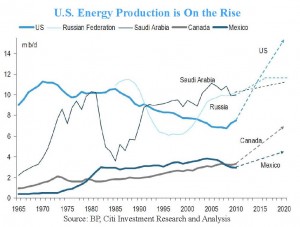 Major developments that have led to a boom in the energy industry have placed the United States on track to becoming the largest energy producer in the world, surpassing Saudi Arabia and Russia.1
Major developments that have led to a boom in the energy industry have placed the United States on track to becoming the largest energy producer in the world, surpassing Saudi Arabia and Russia.1
In the State of the Union address, President Obama indicated that “we’re finally poised to control our own energy future. We produce more oil at home than we have in 15 years.”2
According to a Citigroup report titled Energy 2020: Independence Day, “U.S. oil and gas production is evolving so rapidly—and demand is dropping so quickly—that in just five years the U.S. could no longer need to buy oil from any source but Canada.”
The International Energy Agency predicts that “the United States will overtake Saudi Arabia to become the world’s biggest oil producer before 2020, and will be energy independent 10 years later.”
New technologies like hydraulic-fracturing, or “fracking,” have made the extraction of oil and gas from shale rock profitable.
In Utah, towns like Vernal and Roosevelt have had an influx of workers as oil companies race to develop new oil wells. The energy boom in Utah is just a microcosm of what is happening in the nation. More energy production creates jobs, which pump money back into the economy. It reduces our reliance on foreign countries, which allows us to control our own future.
Unfortunately, energy independence by itself may not lead to lower gas prices. Canada is completely energy independent, yet their gasoline costs about the same as ours. This is because there is a global market for oil and there is one price at which it is sold.3 We may only see a decrease in prices if the cost of oil drops globally.
Fracking also gives us access to vast natural gas reserves. Some estimates indicate we have over a 100- year supply if consumption remains at 2010 levels.4 Higher supply and lower prices are leading to more manufacturing in the United States.
Many power companies are switching to natural gas to fuel their electric plants. Natural gas burns cleaner than coal. Therefore, it is easier for power plants to meet emission standards. This abundance of natural gas has also made energy bills more palatable for cooling in the summer and heating in the winter.
The potential benefit of energy independence is not without its hurdles. Environmental concerns, limited infrastructure, and water restrictions have slowed progress. Despite these hurdles, the race towards energy independence sprints forward. Energy independence has become a reality that may improve the economy and your pocketbook.
(1) Mark Thompson, “U.S. to Become Biggest Oil Producer – IEA,” CNNMoney, 11/12/12.
(2) http://www.whitehouse.gov/the-press-office/2013/02/12/remarks-president-state-union-address.
(3) David Kestenbaum, “Energy Independence Wouldn’t Make Gasoline Any Cheaper”, NPR, 10/26/12.
(4) Gerri Willis,”What Obama Can’t Take Credit For in SOTU,” Fox Business, 1/24/12.
(2) http://www.whitehouse.gov/the-press-office/2013/02/12/remarks-president-state-union-address.
(3) David Kestenbaum, “Energy Independence Wouldn’t Make Gasoline Any Cheaper”, NPR, 10/26/12.
(4) Gerri Willis,”What Obama Can’t Take Credit For in SOTU,” Fox Business, 1/24/12.



